| 15-01-2015
LOW CARBON AT WORK. FINAL INTERVIEWS
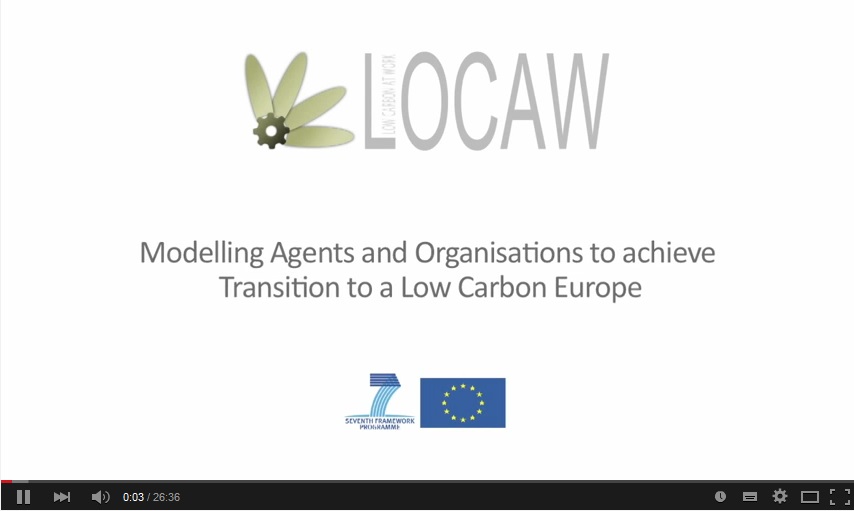
CLICK ON THE IMAGE ...................................................................................................... 04-06-2014
UNIVERSITIES IN TRANSITION TO SUSTAINABILITY
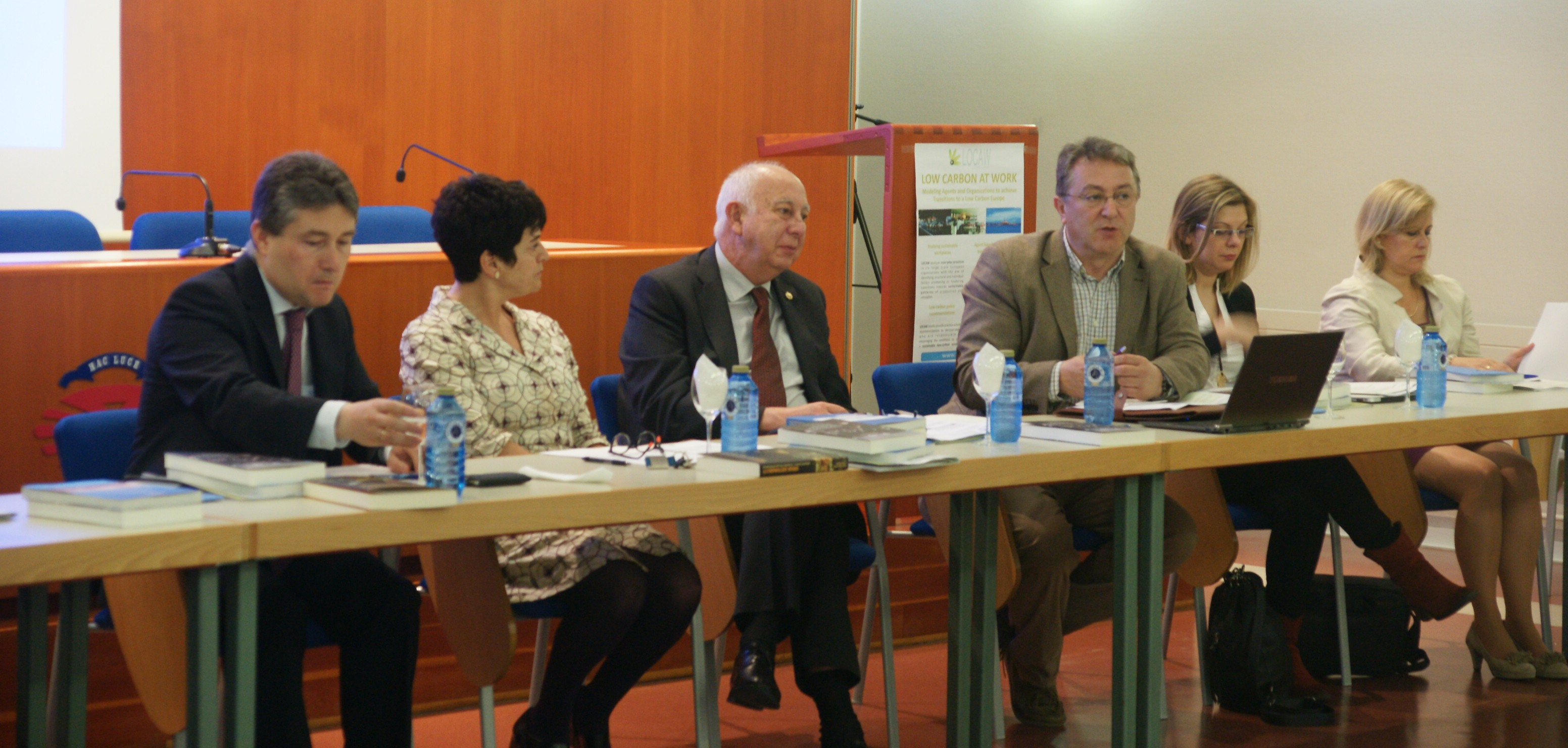
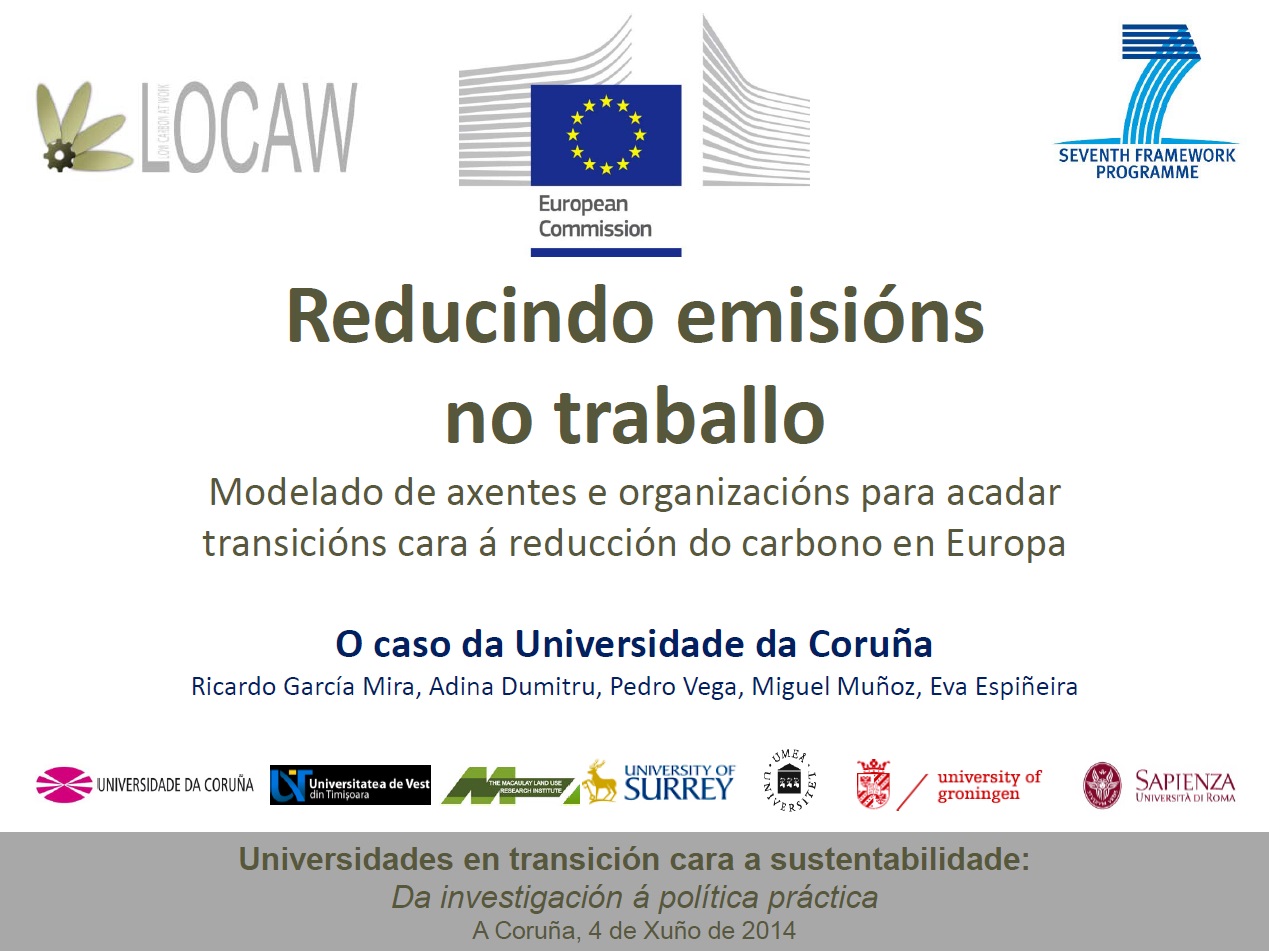 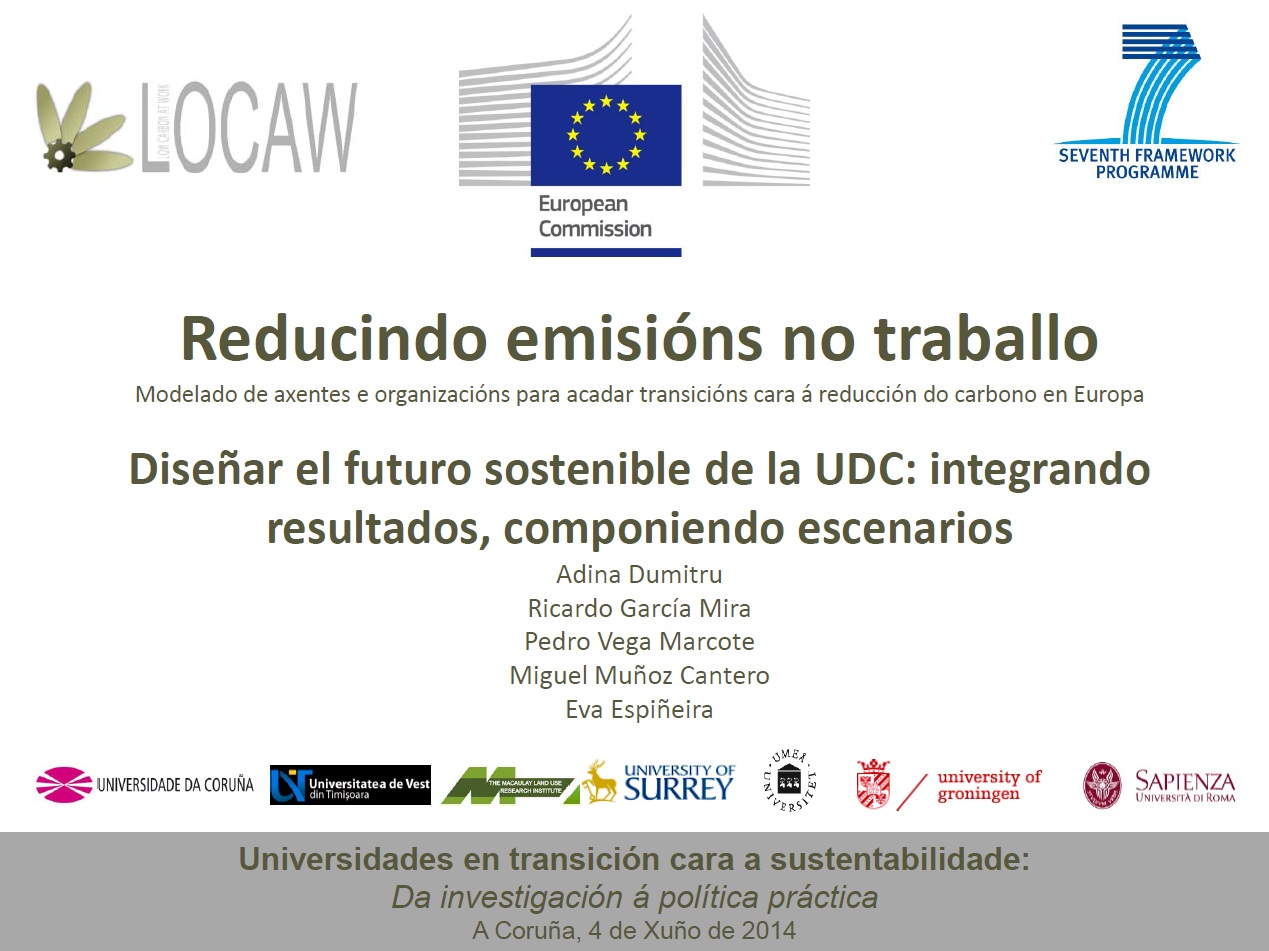
Prof. Ricardo García Mira A. Prof. Adina Dumitru
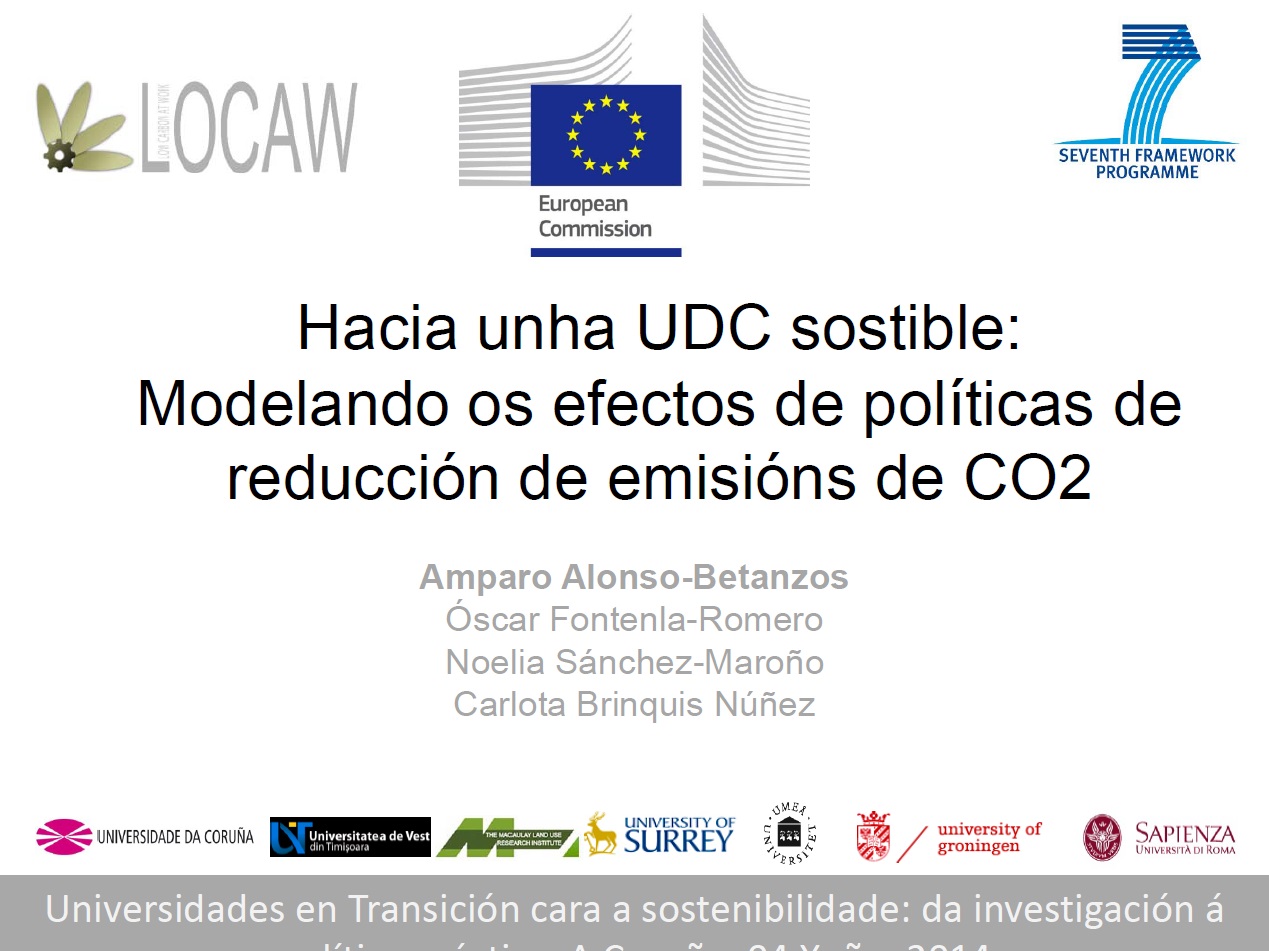 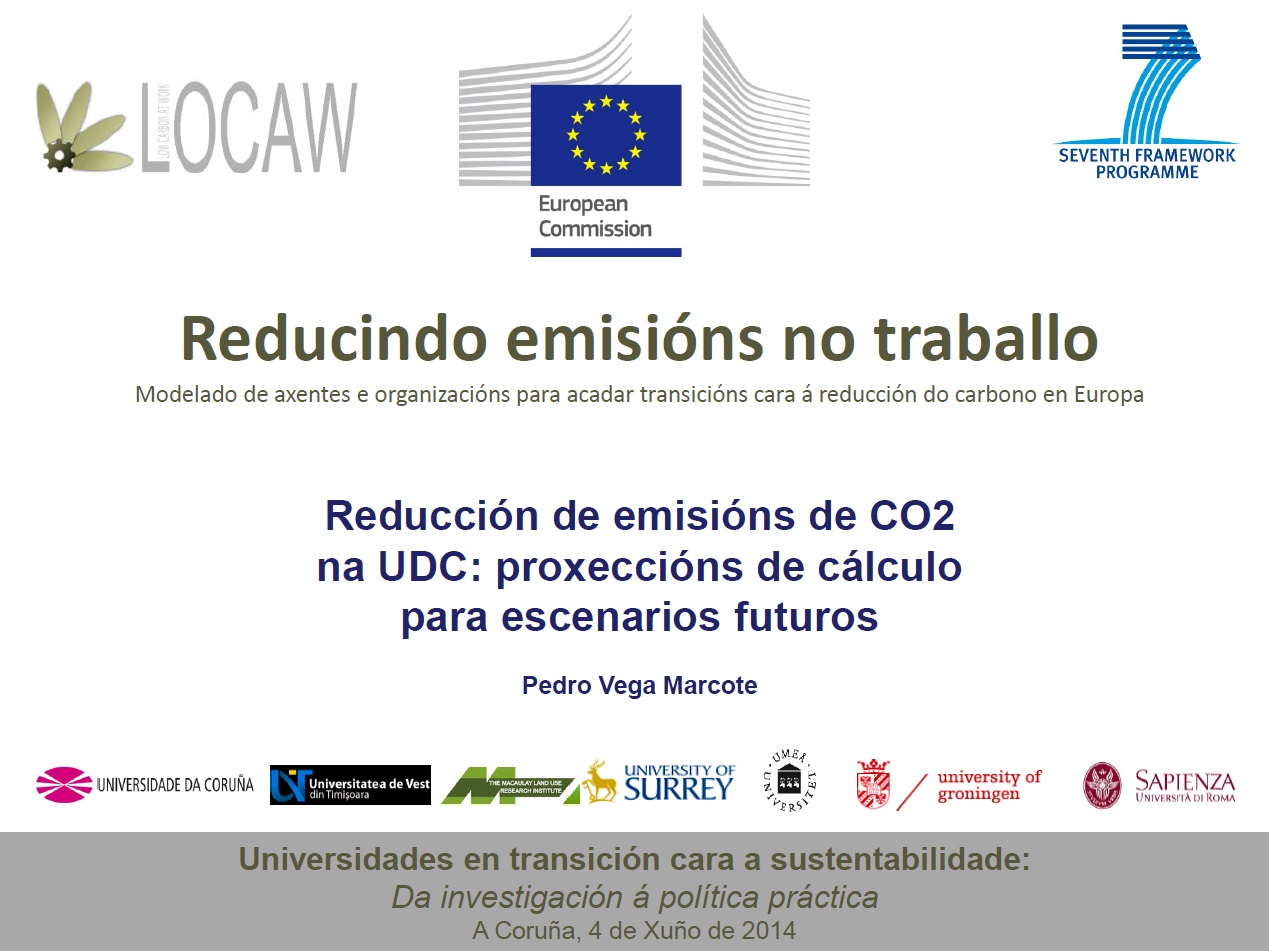
Prof. Amparo Alonso Betanzos Prof. Pedro Vega Marcote
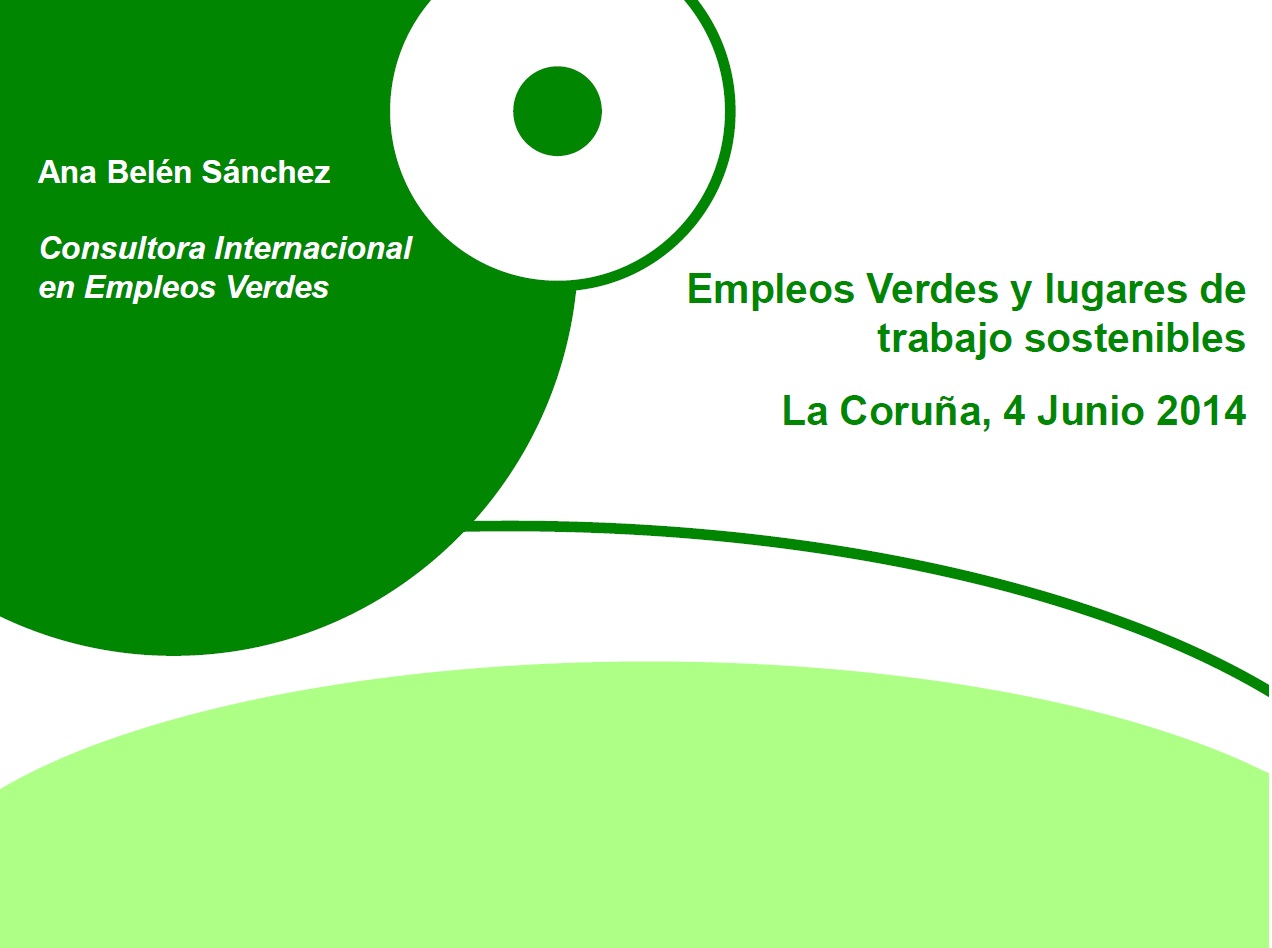
Ana Sánchez
CLICK ON THE IMAGES TO DOWNLOAD PRESENTATIONS (GA)
University of A Coruña holds a Seminar to present LOCAW Project Results.
People Environment Research Group organizes a public seminar to share LOCAW Results with all UDC employees and stakeholders who have collaborated with this research. University of A Coruña was one case study of the LOCAW Project, different departments and more than 380 persons who work in this institution have participated through workshops, interviews and surveys.
Rector of the University of Santiago de Compostela, Prof Juan Casares Long, Vice - Rector of the University of A Coruña, Prof Ricardo Cao and Prof Ana Iglesias, Dean of the Faculty of Educational Sciences, opened this Research Results Meeting.
Professors García Mira, Coordinator of LOCAW Consortium, Amparo Alonso and Adina Dumitru presented project results and focused on recommendations for promoting sustainable practices on Universities.
Professors Pedro Vega and Manuel Soto analyzed the implementation and assessment of environmental policies within Universities.
Mr. Manuel Ferri, ISTAS, and Ms. Ana Belén Sánchez, Sustainlabour, discussed about sustainability accessing work and green jobs. In the afternoon Prof García Mira and Adina Dumitru introduced two new European Projects coordinated and participated by People Environment Research Group:
Members of the Group briefly introduced their work from different disciplines and fields of research, namely: architecture, sociology, psychology and social sciences in general.
Download Program (GA) ...................................................................................................... 03-12-2013
THE LOCAW FINAL SEMINAR. BRUSSELS 10th 2013
Please, follow this link: THE LOCAW FINAL SEMINAR. BRUSSELS 10th 2013
...................................................................................................... 19-07-2013
THE USE OF BACKCASTING SCENARIOS IN DEFINING SUSTAINABLE CHANGE IN UNIVERSITIES
LOCAW Consortium has participated in the 34th Interamerican Congress of Psychology; Adina Dumitru has presented a proposal related with the use of Back-casting Scenarios in the definition of sustainable change in the Universities.

...................................................................................................... 25-06-2013
IAPS. LOCAW SYMPOSIUM
Bridging the gap between qualitative and quantitative methods in sustainability research: An introduction to the multi-method approach in LOCAW.
LOCAW Consortium Presentation. Speakers:
Prof. Ricardo Garcia Mira: LOCAW Project Coordinator. UDC
Dr Antony Craig. Macaulay Land Use Research Institute
Alexandra Docea. West University of Timisoara
Adina Dumitru. UDC & UVT
CLICK ON THE IMAGE TO ACCESS CONTENTS
...................................................................................................... 13-06-2013
A DECISION MAKING MODEL FOR ENVIRONMENTAL BEHAVIOUR IN ABM
Professor Noelia Sánchez-Maroño has presented the intermediary results of LOCAW modellers in the International 12th Work Conference on Artificial Neuronal Networks held in Tenerife.
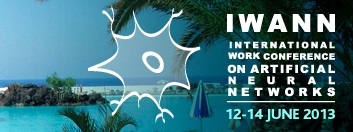 CLICK ON THE IMAGE TO DOWNLOAD PAPER CLICK ON THE IMAGE TO DOWNLOAD PAPER
Agent-based modeling (ABM) is an increasingly popular technique for modeling organizations or societies. In this paper, a new approach for modeling decision-making for the environmental decisions of agents in an organization modeled using ABM is devised. The decision making model has been constructed using data obtained by responses of individuals of the organizations to a questionnaire. As the number of responses is small, while the number of variables measured is relatively high, and obtained decision rules should be explicit, decision trees were selected to generate the model after applying different techniques to properly preprocess the data set. The results obtained for an academic organization are presented. ...................................................................................................... 10-05-2013
WORKPLACES IN TRANSNATIONAL CORPORATIONS
Professors David Uzzel and Nora Rathzel have presented their research results about "Workplaces in transnational corporations: the relationships between governments, workplaces and home" in the multi-disciplinary workshop "Greening Economics, Greening Society: What is the role of the UE?" organised by the Institute of Advanced Studies from the University of Surrey.

CLICK ON THE IMAGE TO DOWNLOAD PRESENTATION
How can we alter our economies and societies to adapt to the environmental crisis? Climate change and biodiversity loss reveal the unsustainability of our economic and social models, and yet a truly green economy remains a long way off. The necessary social changes are equally distant, and debate between academics and policy-makers remains too often a ‘dialogue of the deaf.’
Centre for Research on the European Matrix (CRonEM) has won a grant from the Institute of Advanced Studies to host a multi-disciplinary workshop, which also crosses academic/policy-maker frontiers, on how to green the economy and society of the EU – not only a transnational political system in its own right, but a major shaper of the global economic order and international environment policy. Keynote speeches will be delivered by Prof Molly Scott Cato (Roehampton University) and Dr Miriam Kennett (Green Economics Foundation) , with policy-maker perspectives provided by, among others, Dr Mikael Karlsson, President of the European Environment Bureau.
The event is co-organised by University of Surrey scholars Prof Rosalind Malcolm (School of Law); Prof Stephen Morse (Centre for Environmental Strategy); Prof David Uzzell (School of Psychology) and Prof Alex Warleigh-Lack (CRonEM/School of Politics) together with Prof Simon Bell (Open University). ...................................................................................................... 13-12-2012
BACKCASTING SCENARIOS: ENEL, ITALY
The backcasting scenario workshops within the company ENEL Green Power (EGP), for the LOCAW UE-FP7 project, were conducted by the Italian LOCAW team during the month of December 2012, with the active support of the Human Resources office of EGP. From the LOCAW Italian research team, Giuseppe Carrus,Fridanna Maricchiolo, Stefano De Dominicis, and Salvatore Mura took part in the workshops. From the EGP management, Vittorio Ayra, Giuseppe Capitani, Umberto Magrini, and Pasquale Monti participated.
The first session took place in December 10th 2012, discussing and setting up the possible future scenarios in the domain of Co2 emission reduction practices and policies. Participants from the EGP management were briefly introduced to the scope and aims of the exercises, and then let free to discuss and propose their visions about the topic under discussion, using a brainstorming approach. In the second session of the workshop, which took place on December 13th 2012, three possible scenarios developed during the first day were discussed and refined.
During the first session (visioning workshop) three main scenarios, depicting the situation of EGP and of the society at large, varying across increasing levels of futurability and uncertainty were identified. The first scenario is characterized by a very high level of technological improvement and development; in the second one, EGP is envisaged as a green company, using only energy supplies from renewable sources; in the third scenario, EGP offices are seen as a totally virtual company, with very limited physical structures.
The second session (Back-casting workshop) started with a brief summary about the general strategies that should characterize the company in 2050, and that will constitute the main boundary conditions for each of the three scenario envisioned during the first session. According to a vision shared and discussed among all the participants, the general strategy of EGP in 2050 should aim at establishing the company identity with the concept of sustainability (economic return in a sustainable way), and the company should be at the forefront on this issue. It will choose to pursue this avenue before other companies, to get to this trend. EGP should be recognized abroad and from the outside as a pioneer company in terms of environmental sustainability and will have to bring this cutting-edge innovative choice to other players: EGP will have to "sell" the cutting edge to the others. A preliminary list of concrete public and organizational policy tracks that emerged from the discussions along the two sessions is provided below (reflecting a possible temporal scansion of policies tracks in the short, medium or long term).
- Network and infrastructure development (communication, teleworking, energy demand monitoring and regulation, transport)
- Increase of public awareness and responsibilities: public regulation will follow
- Include environmental concern among personnel selection criteria
- Combination of resource saving and strategic investments for efficiency in the short/medium term
- Need for implementation of low-cost/high-return technology
- Hybrid energy production systems, with higher regulation and automation capacity, to achieve equilibrium and technology maturity in 2030
- Increase of data and information gathering about consumer’s uses and lifestyle, to improve regulations policies
- Intelligent production-consumption links and communication
- Electric vehicles complete diffusion
- Market investments once technology is mature
- Massive organizational investments on the medium/long term for new efficient office building construction and renovation
- Energy productive surfaces
- Energy productive human movements
- Solar energy as main future global source
...................................................................................................... 10-12-2012
IV STEERING COMMITTEE MEETING. TIMISOARA
LOCAW IV Steering Committee Meeting took place in the Universitatea de Vest din Timisoara, Romania, coinciding with the halfway of Project development.
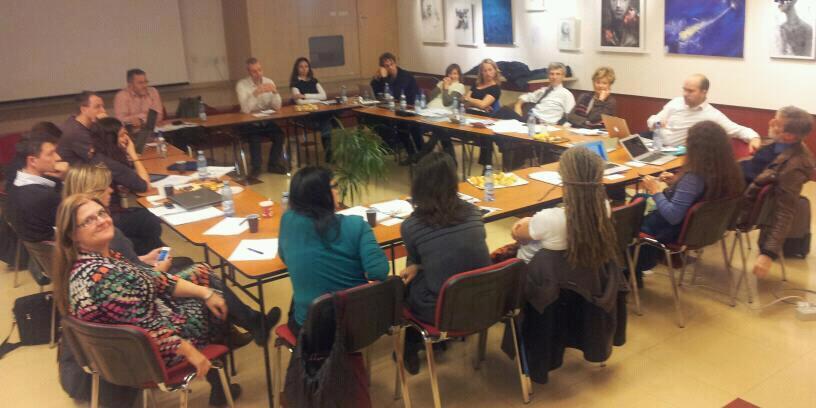
Partners met to finalize the last reports of the 2012 production, especially those linked with the structural and organizational factors influencing sustainability-related everyday practices in the workplace (WP3) and with the individual factors promoting or hindering sustainable behaviours at work (WP4).
All the Consortium members had the opportunity to present their progress and an integrative approach between different Work Packages´results and study cases was made. Professor Uzzell led the debate on the role of EU as an international climate actor, and several meetings took place with stakeholders. ...................................................................................................... 06-12-2012
CERCETATORII DIN CADRUL PROIECTULUI LOCAW VIZITEAZA AQUATIM SI STATIA DE EPURARE DIN TIMISOARA
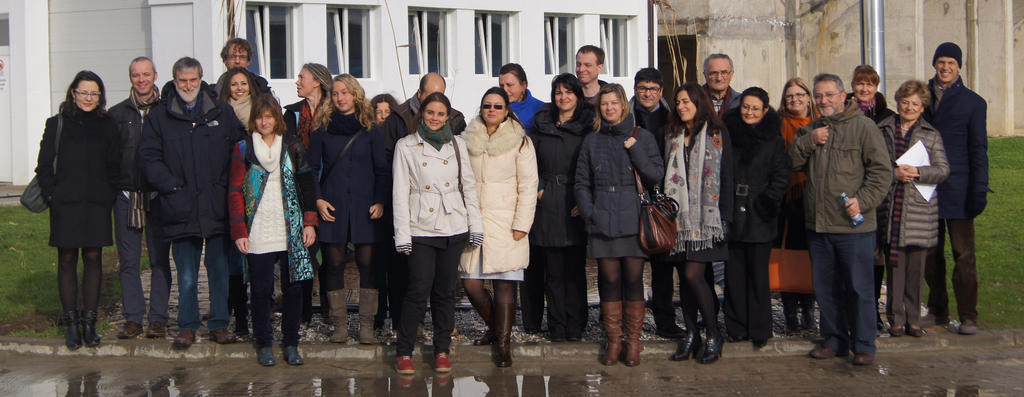
LOCAW team visiting AQUATIM. Press here to download Aquastiri ...................................................................................................... 22-11-2012
A CORUÑA, SECOND WORKSHOP ON BACK-CASTING SCENARIOS

The Second Workshop on Backcasting Scenarios Development has been organized in Spain. The researchers had the opportunity to energize a large group of experts related to the institution to discuss and develop two possible future scenarios for the University of A Coruña.
Participants are specialists from different disciplines: architecture, economics, engineering, new technologies, artificial intelligence, education or sociology and all of them possess an important background related to the environment.
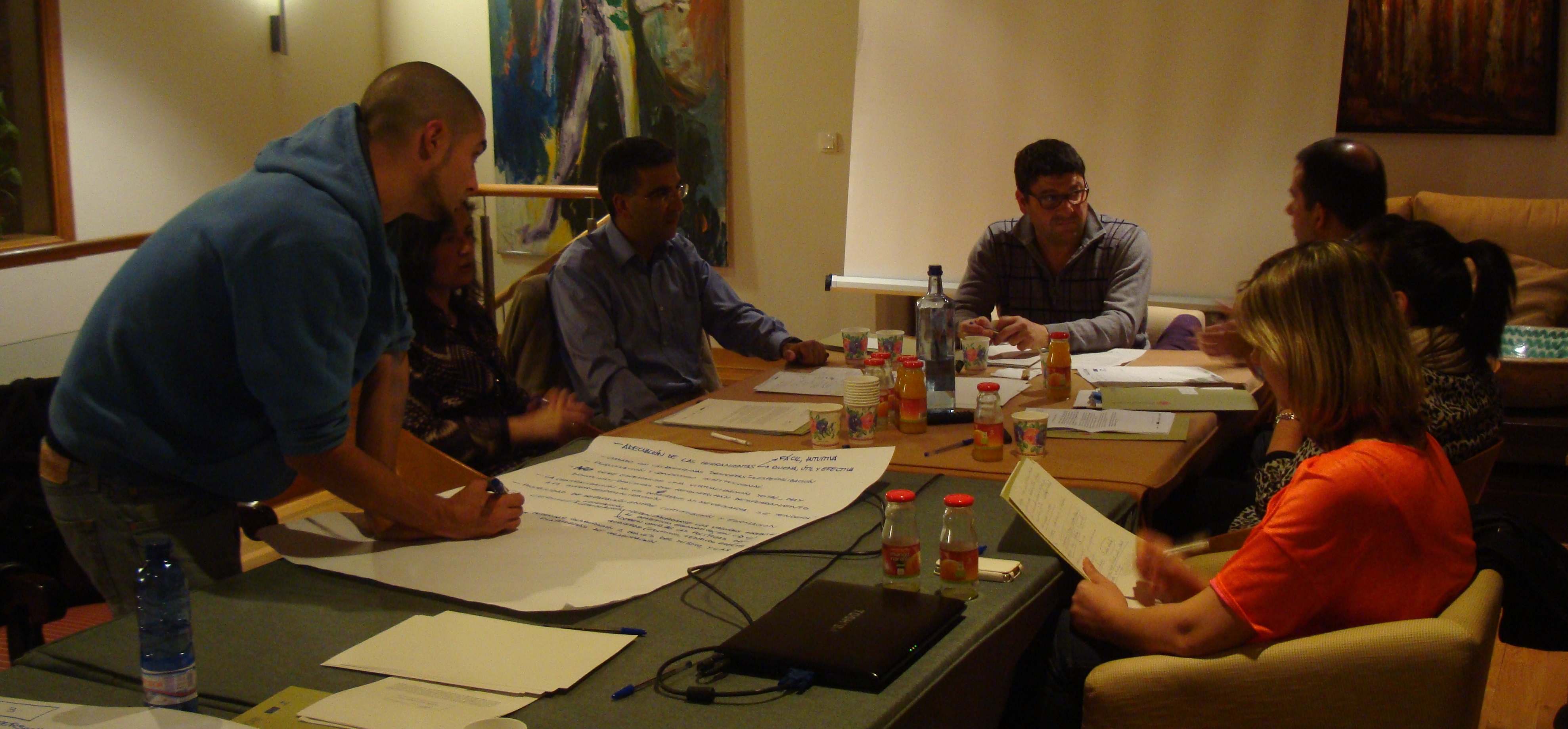 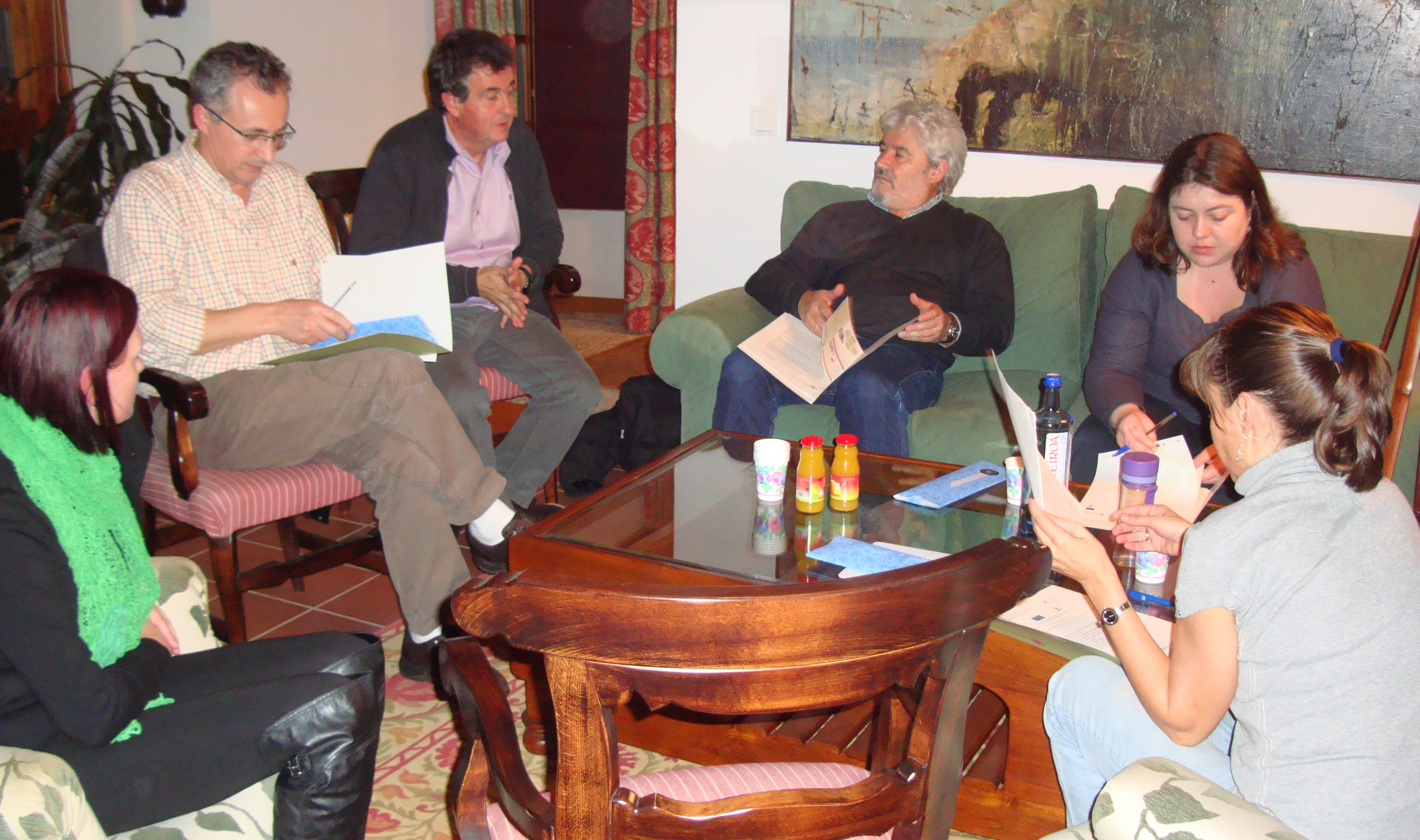
The workshop continued to develop two of the possible models discussed at the first meeting. In general terms, one of the scenarios was based on a significant increase in the use of new technologies and the subsequent relocation of the physical spaces of the University, and the other one focused in a greater concentration of the University spaces, improving public transportation and the efficiency applied to architecture (energy, water and waste management).
...................................................................................................... 03-08-2012
LOCAW FIRST PERIODIC REPORT
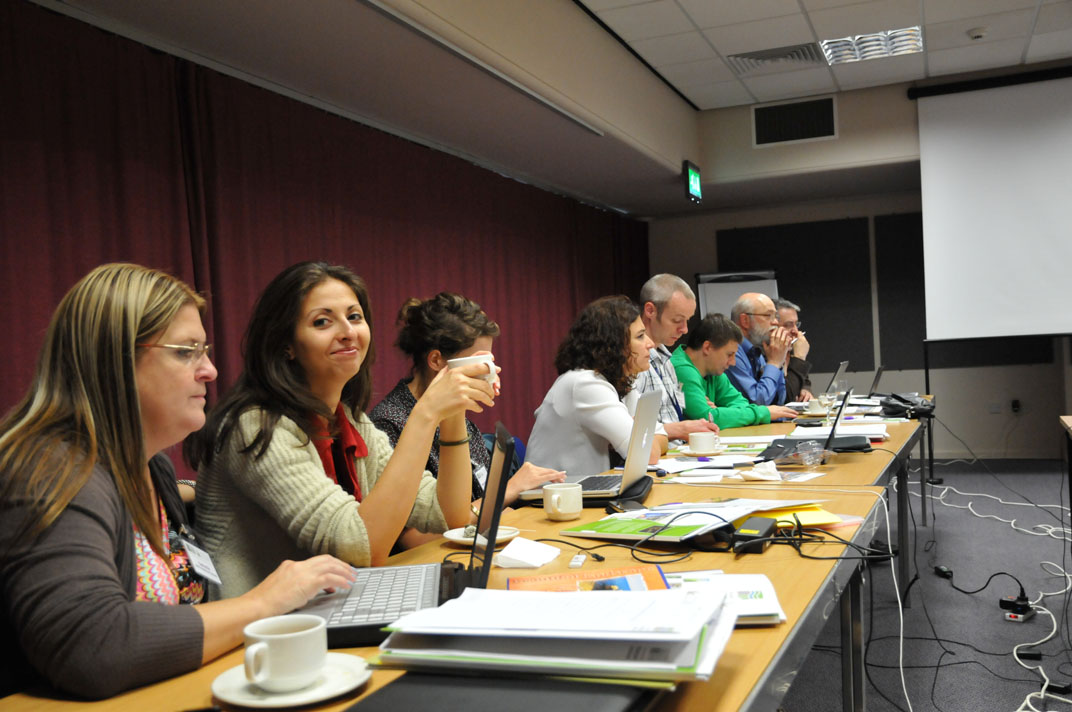 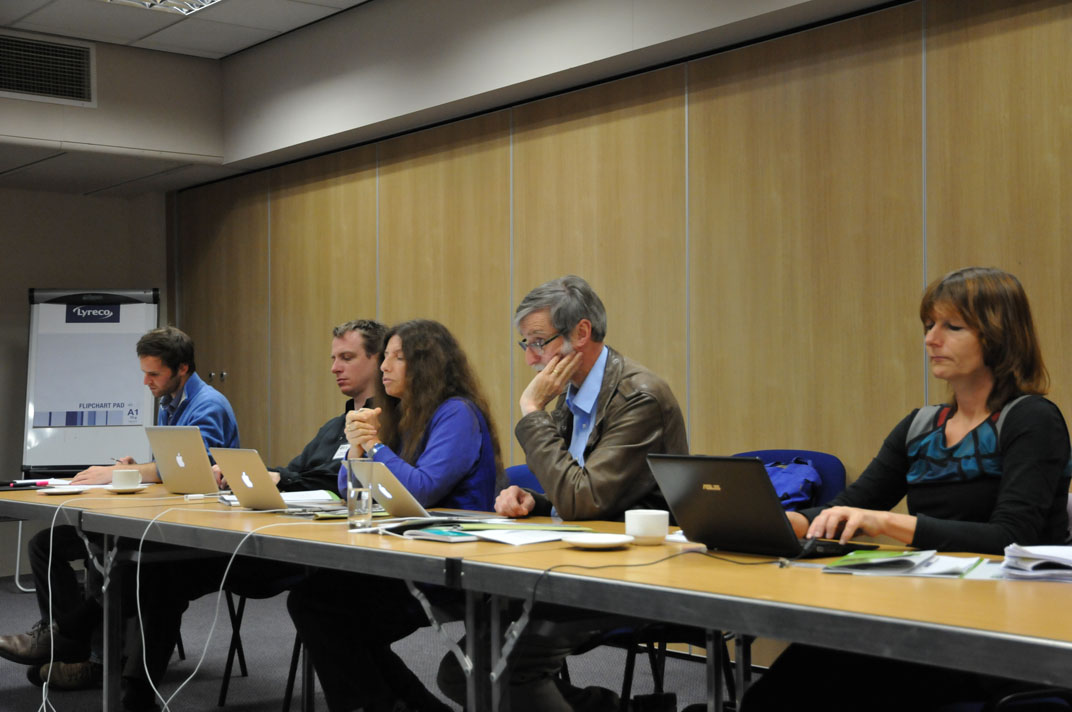
The first part of the project has consisted of a diagnosis of everyday practices and organizational policies in the six organizations under study. It has been achieved through a multi-method approach that has mixed desktop research, analyses of organizational documents, interviews with key informers, and focus groups. It allowed a complex picture of everyday practices in different types of organizations across Europe and an initial analysis of the barriers to, and drivers of, sustainable practices in the workplace.
The second part of LOCAW, which is now in progress, delves into an in-depth analysis of structural or macro- and individual or micro-factors influencing everyday practices at work. It also includes the creation of sustainable and normative visions of the future for each organization and the use of back-casting as a tool to create a roadmap for designing policy that will inform transitions to more sustainable practices in organizations and will lead to more successful collaborations between institutional actors (Dumitru & García-Mira, 2012). A significant part of this work has been undertaken already, and preliminary results are available.
The third part of LOCAW focuses on an analysis of the work-family-leisure interface, as well as an analysis of the relationships among trade unions, the workforce and management in promoting or hindering sustainable everyday practices in the workplace. The methodology used in this part consists of both document analysis and life-history interviews.
...................................................................................................... 24-06-2012
XXII Conference of the International Association of People-Environment Studies
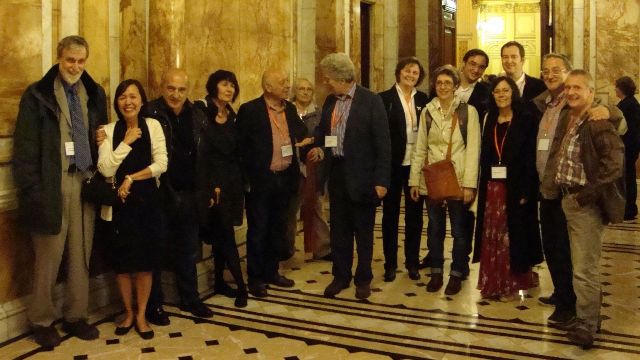
From 24th to 29th June 2012 the 22nd IAPS Conference was held in Glasgow, UK. LOCAW Consortium has presented the next Symposium:
Visions of the past and future: participatory approaches to identifying sustainable pathways in organisations
Conveners:
Ricardo García-Mira*, David Uzzell** & Giuseppe Carrus***
* University of Corunna (Spain); ** University of Surrey (UK); *** University of Roma Tre (Italy)
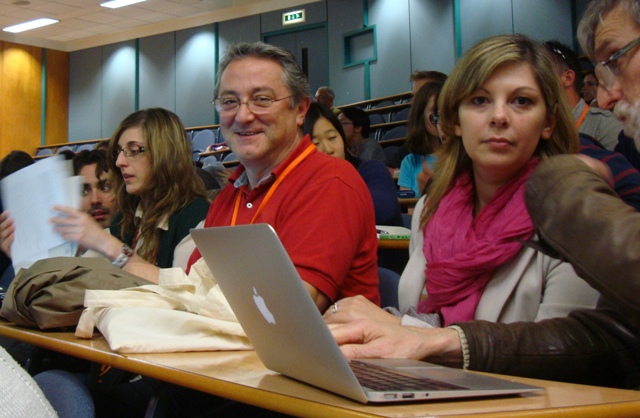
...................................................................................................... 05-06-2012
BACKCASTING SCENARIOS DEVELOPMENT: UNIVERSITY OF A CORUÑA
As LOCAW team did in Romania, the First Workshop on Backcasting Scenarios Development has been organized in Spain. This time the protagonist organization was the University of A Coruña. The researchers had the opportunity to energize a large group of experts related to the institution, as well as the business world of the community that hosts.
Participants are specialists from different disciplines, including architecture, economics, engineering, law, new technologies, artificial intelligence, education or sociology and all of them possess an important background related to the environment.
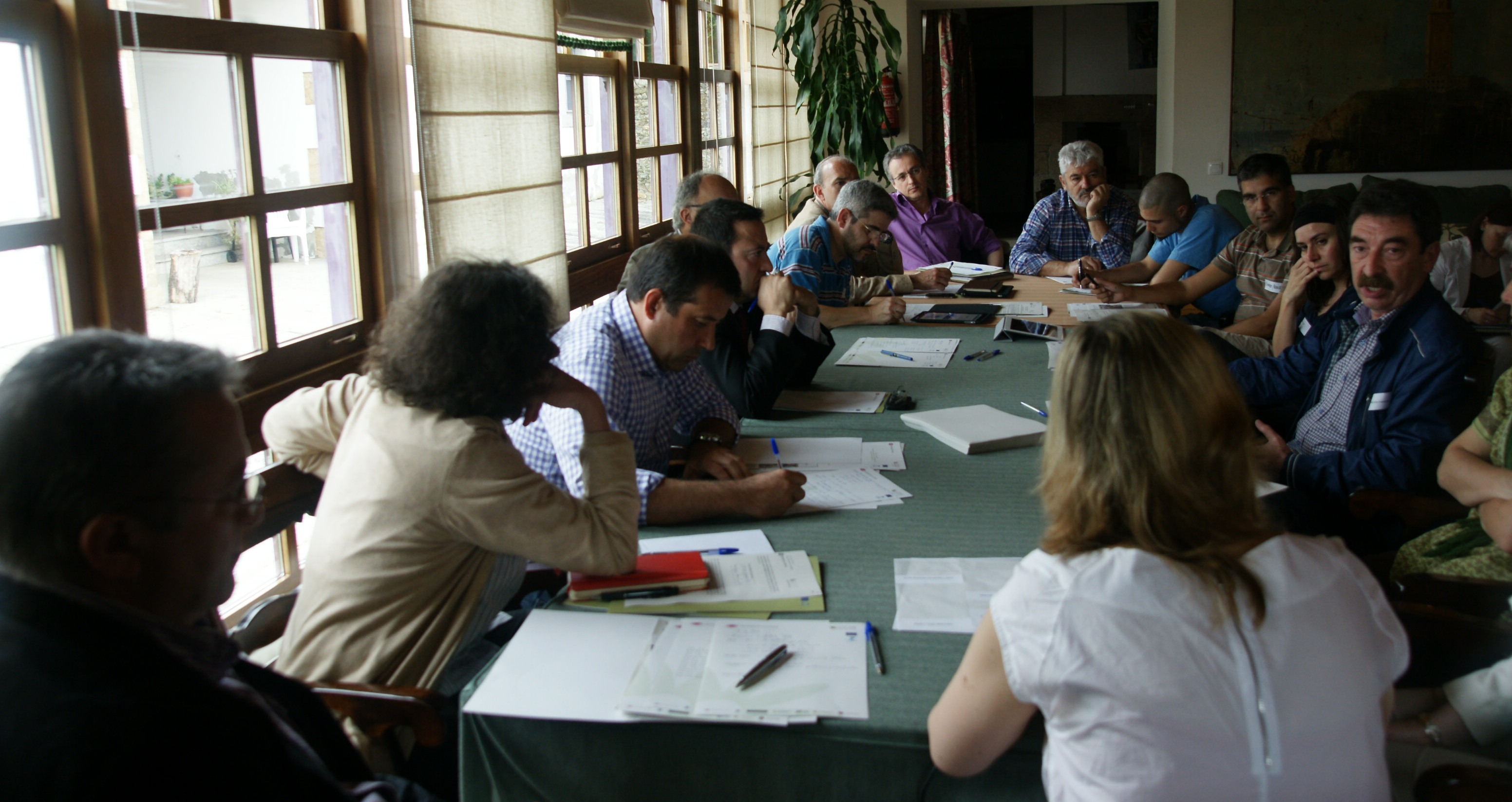 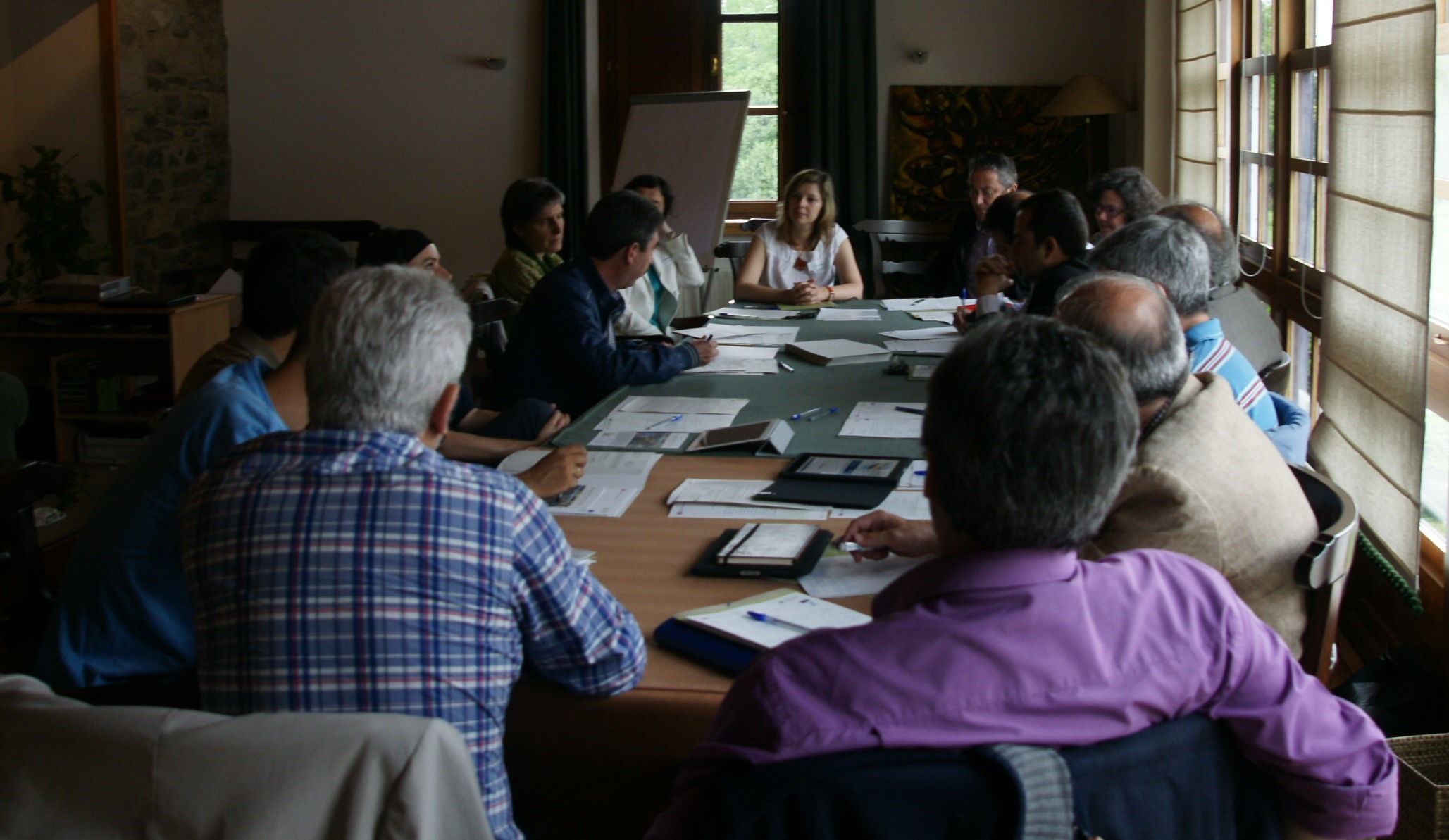
The workshop started with an explanation about the Back-casting methodology followed by exercise in groups. Many proposals were made by the participants, at least could be identified two main scenarios for the future.
The following exercise will develop the possibilities opened in the present to arrange the scenarios that the University could have achieved by 2050. ...................................................................................................... 29-05-2012
II BACK-CASTING WORKSHOP IN ROMANIA
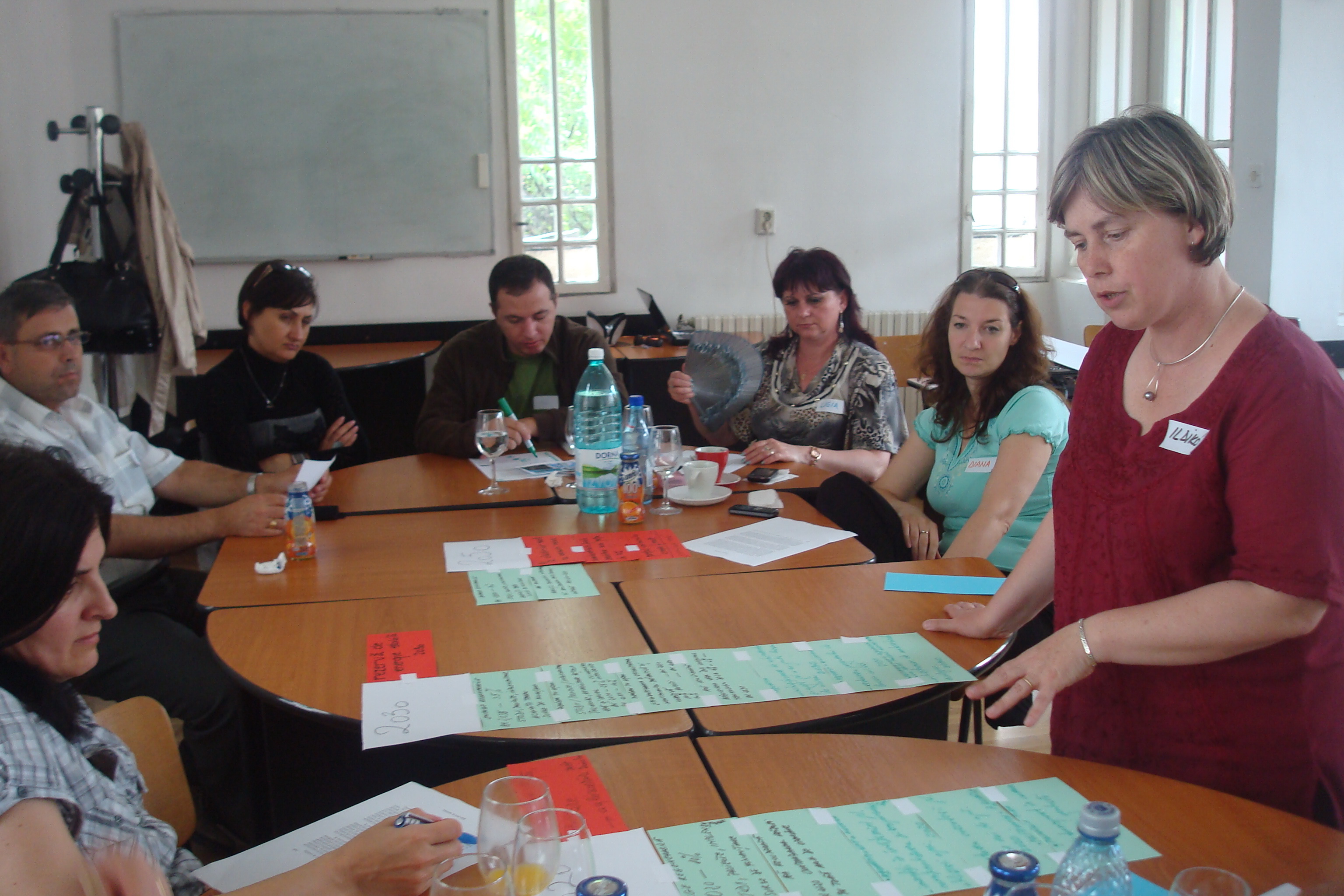
On May 29th, 2012, a second workshop aiming to run the back-casting process starting from the vision created during the workshop held on May 8th, took place in Timisoara.
The workshop was coordinated by Ildiko Erdei and the participants were ten members from Aquatim’s middle management level, five of them also participated in the vision creation first workshop.
In the first stage participants contributed to the completion and finalization of the vision of their organization in 2050, and then, from this view, they set targets, expressed as percentages, for each major change indicated by them in the vision. Then followed the back-casting process during which the participants, divided into two sub-groups according to their area of competence, described the changes that would had taken place in 2050, then in 2030 and 2020, finally, indicating the present situation in each of the areas of change. At the end, there were discussions on the key points of change and the actors involved in change processes, summarizing the achievement of the points of the starting vision. ...................................................................................................... 08-05-2012
FIRST ROMANIAN WORKSHOP ON BACKCASTING SCENARIOS DEVELOPMENT
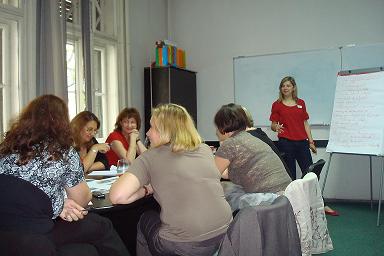
The first workshop on backcasting scenarios development, organized within WP3 of the LOCAW project by the Romanian team, was held in Timisoara on the 8th of May 2012. The workshop had a duration of three hours, had 8 participants and focused on the visioning part of back-casting.
Participants were members of the middle management level of the partner organization, Aquatim SA, and the workshop was successfully coordinated by Adina Dumitru and Ildiko Erdei. The workshop was introduced by Corina Ilin, the Romanian team coordinator, who also presented the next steps within the cooperation between the project team and Aquatim in the LOCAW project. Professor Zoltan Bogathy gave the opening speech and assisted with the workshop.
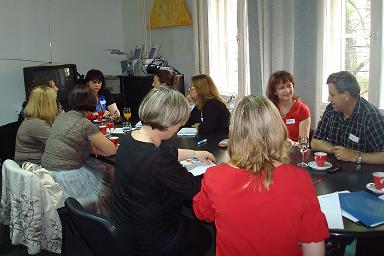 The workshop started with an ice-breaking exercise in pairs, followed by an exercise meant to facilitate the detachment of participants from the present and the creation of images of a relatively distant future. Then, the actual phases of the visioning exercise were performed under the direction of the two facilitators. The workshop started with an ice-breaking exercise in pairs, followed by an exercise meant to facilitate the detachment of participants from the present and the creation of images of a relatively distant future. Then, the actual phases of the visioning exercise were performed under the direction of the two facilitators.
Participants created images of a sustainable organization in 2050, identified the structural, socio-cultural, technological and organizational changes needed for the visions to be implemented and then sketched, in micro-group discussions, a typical working day in Aquatim, in 2050.
...................................................................................................... 14-03-2012
LOCAW: AT THE FOREFRONT OF EUROPE TRAINING
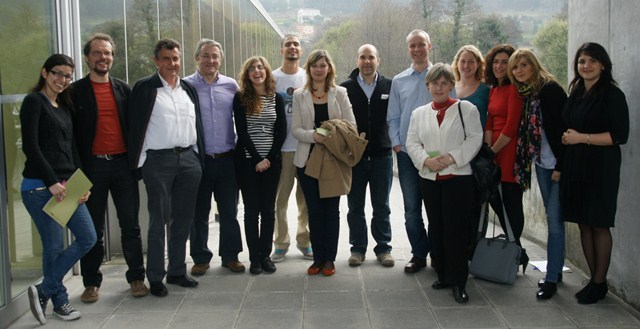
Professor Jacobus Quist from Delft University of Technology, Netherlands,will teach a workshop about Back-casting development scenarios.
Participants of six European countries will attend this seminar, they are members of LOCAW Project, focused on how to achieve a Low Carbon Europe.
LOCAW Project, Low Carbon at Work, involves the participation of seven research organizations of six European countries and focuses on the study of drivers and barriers in the workplace to achieve a Low Carbon Europe.The project analyzes and models six different public and private organizations throughout Europe applying Back-casting methodology among others.
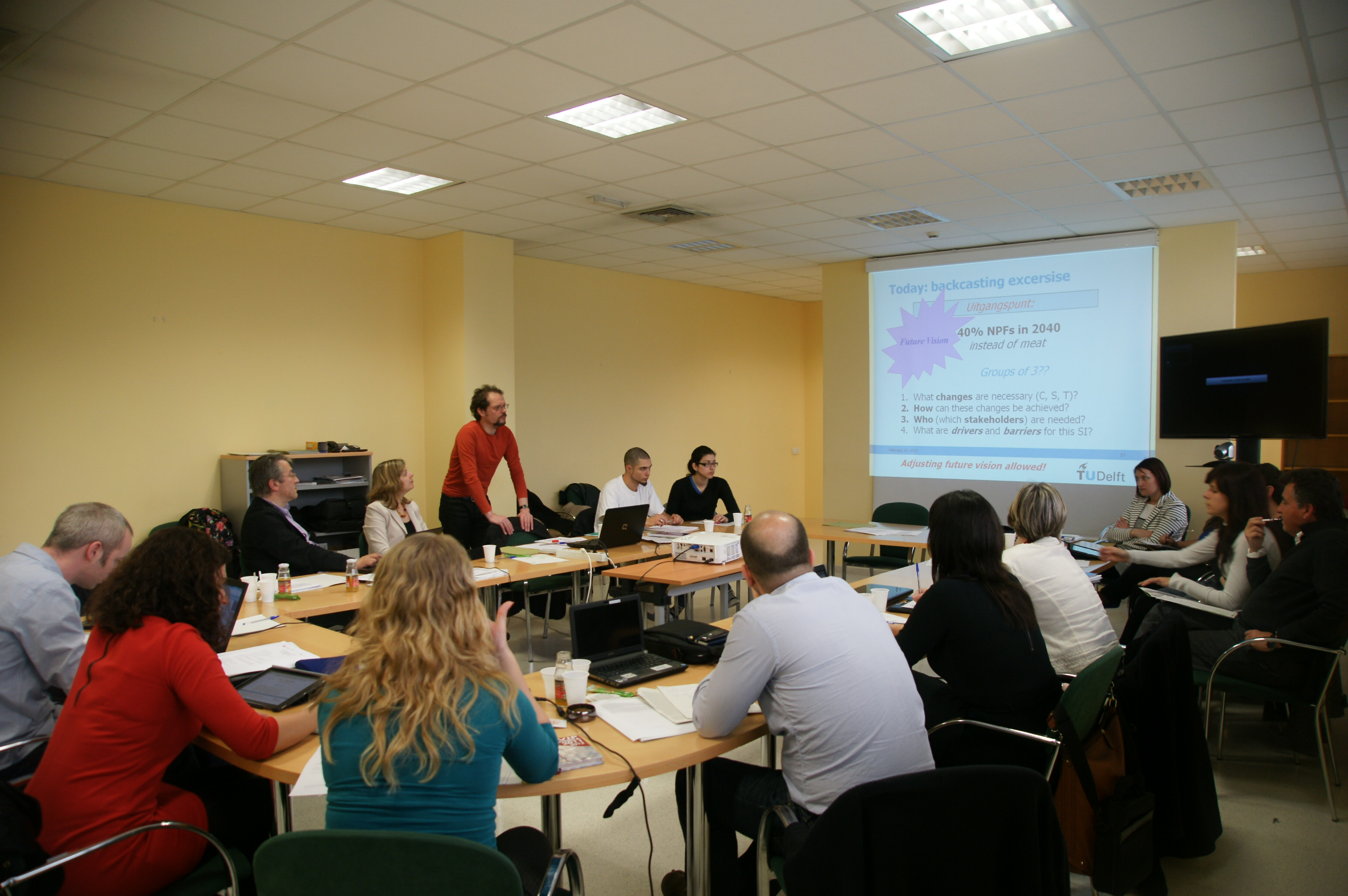
Professor Quist is an international reference in the development of Back-casting which is increasingly more used by the European Commission to anticipate future scenarios and the way to achieve them, thus guiding the decision-making process. He will share his knowledge with LOCAW researches and People – Environment Research Group of the University of A Coruña.
SCHEDULE
...................................................................................................... 25-02-2012
UMEA. STRUCTURAL AND ORGANIZATIONAL FACTORS
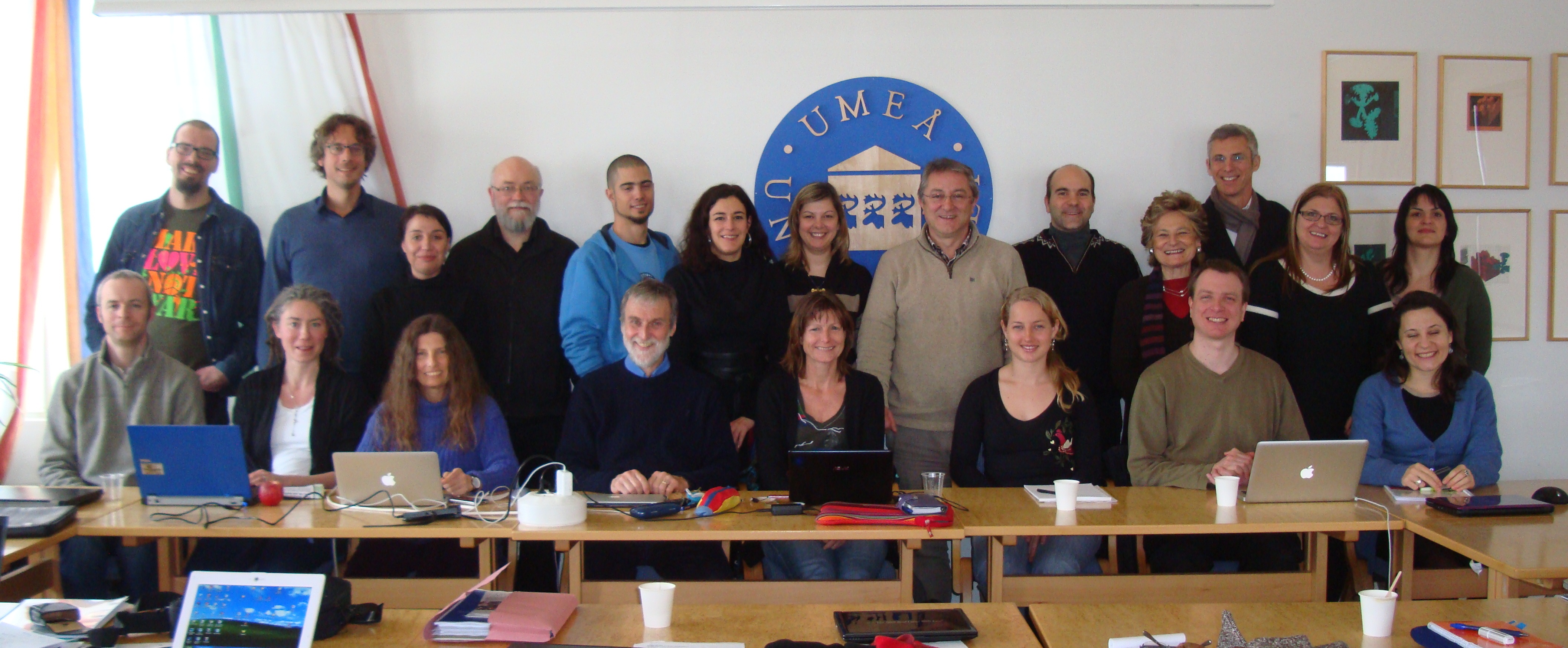
LOCAW Meeting in Umeå, Sweden. 23 – 25 February 2012
Thursday the 23rd
Morning
8:45 – 9:00 Organisational issues, discussion and finalising of the agenda
9:00 – 9:30 Results from WP 3 (Romania)
9:30 – 10:00 Results from WP 3 (Italy)
10:30 – 11:00 Results fromWP3 (Spain)
10:30 – 11:00 Results from WP3 (the Netherlands)
Afternoon
12: 30 – 15:00 Visit Umeå EnergiIncinerator
15:30 – 16:00 WP1: First Periodic Report (Lead - Marta Alvarez)
16:00 – 17:00 WP3: Theoretical Discussion: Some theoretical and empirical aspects of normative influence on pro-environmental behaviour (Lead - Giuseppe Carrus)
Friday, the 24th
Morning
9:00 – 10: 45 WP6: Modelling
11:15 – 12:00 WP5: Theoretical issues: The challenge of linking agency and structure (Lead - Markieta Domecka)
Afternoon
13: 15 – 14:15 Maria Sandström: Umea municipality: The work of Umeå communin monitoring environmental behaviour of local companies. Presentation and discussion
15:15 – 16:15 Gunnar Pettersson:Metal workers’ Union (Metalklubben) in Umeå: The contribution of workers to low carbon at work.
16:15 – Fika and informal discussions
Saturday, the 25th
Morning
9:00 – 10:30 Next Steps. WP Plans for the future:
a) WP3
b) WP4
c) WP5
11:00 – 12:00 WP6 Modelling
Afternoon
13.00 – 14.00: Theoretical Issues - the challenges of assuming certain processes of influence; measurement of the processes of social influence among agents in the organization and the ways to conceptualize and measure change as a result of influence (Lead – Linda Steg)
14.00 – 15.00: WP7 Dissemination
...................................................................................................... 29-07-2011
ABERDEEN. INDIVIDUAL, REGIONAL AND SOCIETAL PERSPECTIVES
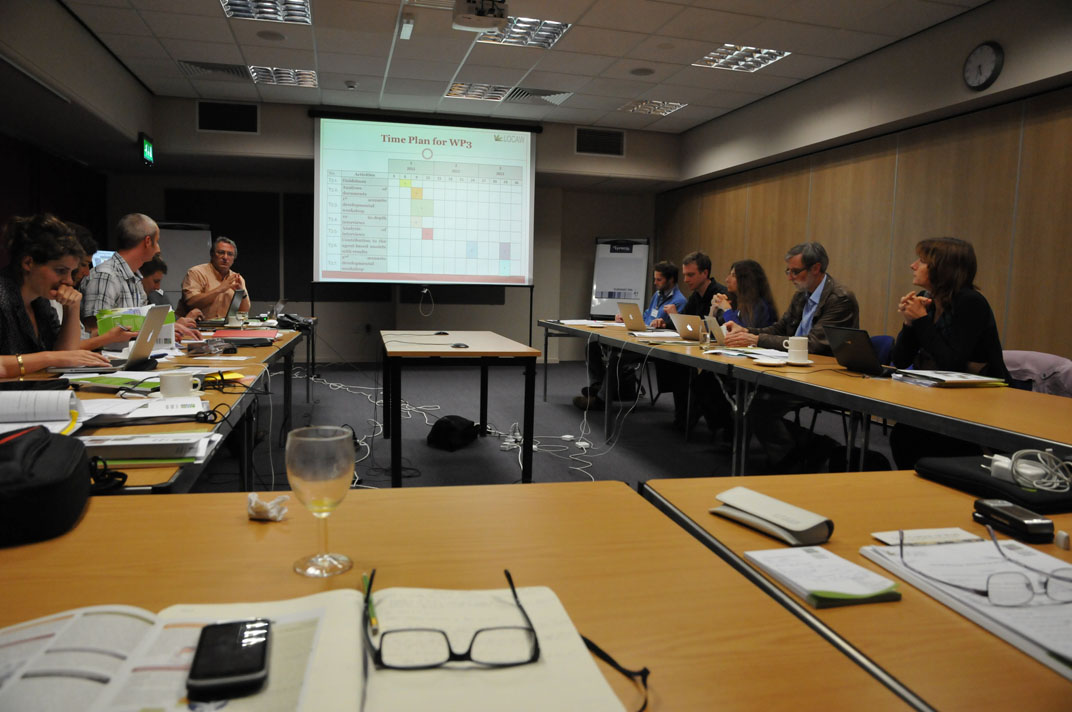
II Steering Committee - James Hutton Institute, Aberdeen
This seminar has been organised as part of the EU FP7 funded LOCAW (Low Carbon at Work) project, which involves partners from 7 countries (Italy, Romania, Spain, Sweden, The Netherlands, England and Scotland). The aim of the LOCAW project is to advance our understanding of the drivers of and barriers to sustainable lifestyles by an integrative investigation of the determinants of everyday practices and behaviours within large scale organisations. This seminar will explore these issues with a particular focus on the local context - namely the Energy Industry. What challenges does the oil and gas sector face in transitioning to a low-carbon future? How important is the shift to renewable energy production from a regional perspective? What is a low-carbon future from the perspective of people employed within the energy industry? What is the relationship between organisational policies and every day (low-carbon) behaviours? Members of the LOCAW research team, and key stakeholders from the Aberdeen region will explore these questions, and discuss some of the opportunities and barriers of transitioning to a low-carbon future.
SEMINAR PROGRAM ...................................................................................................... 15-06-2011
LOCAW BROCHURE: THE EVERY DAY AS A RESEARCH OBJECT

Click the image above to download the leaflet
Low Carbon at Work: Modelling Agents and Organizations to achieve a Low Carbon Europe
LOCAW provides an analysis of everyday practices in the workplace, as well as of the factors promoting or hindering the transition towards sustainable patterns of production and consumption. LOCAW examinesseven large organizations in six different countries, in the public as well as the private sector and both heavy and light industry.
Who is involved in LOCAW?
LOCAW involves the participation of seven research organizations: University of Coruña-Spain (Coordinating), University of Umea-Sweden, West University of Timisoara-Romania, University of Surrey-UK, The James Hutton Institute-UK, University of Groningen-The Netherlands, and University of Rome La Sapienza-Italy. The research has received funding from the European Union FP7 ENV.2010.4.3.4-1, Grant Agreement nº 265155. The total budget for this project is 1.5M Euros, distributed among the seven institutions.
Objective
The project analyzes (un)sustainable behavior and practices in the workplace and focus on the factors determining these actions in six organizations under investigation. The conclusions of this analysis are being used as input for the design of agent-based models which seeks to clarify interactions among relevant actors and provide insights into the necessary conditions to achieve transition to a low-carbon Europe. Although the project’s focus is on workplace behavior, we also analyze the connections between practices at work and practices in other areas of life. Members of the organizations under investigation draw on the agent-based models to create scenarios. They are using their expertise to adjust the models to include predicted future pressures and challenges for their organization. This allows for better predictions and detailed descriptions of how to promote conditions for sustainability at work, as well as examples of good practices.
Questions to be addressed in LOCAW
· How do behaviors and practices in the workplace act as barriers or drivers of changes towards sustainable paths of low-carbon behavior at the individual, organizational and societal level?
· How do EU environmental norms work in practice?
· How do market demands and social group pressures influence the management of everyday practices in the workplace?
· How do organizations create barriers and drivers for the individual involvement in sustainable practices within current EU environmental policies?
· How do people make connections between one area of their life and another? Does this have an impact on their identities, on their roles and everyday behavior related with sustainability?
· What conflicts and barriers exist for the cooperation among policy-makers, employers and social organizations in the implementation of sustainable practices at work?
· What examples of good practices regarding sustainability at work exist and in what conditions are they generated?
The everyday as a research object
LOCAW studies the routines and rituals of everyday life, defined as taken-for-granted practices that are continuously repeated. It is one of the first research studies that explicitly examines sustainable practices and behaviors in the workplace in different EU countries and in several types of organizations.
The interaction between interest, awareness and public action
Although we think that climate change is universally well-known as a preoccupying reality, there are variations in the way it is thought about and discussed. Even if there is concern, this does not always translate into action. This has been referred to by environmental experts and politicians as the Value-Action gap. It may be the result of the necessity to provide clearer and simpler information. In other cases, environmental concern may not translate into specific actions because of the high cost (e.g., time, effort, money) of these actions. Equally, it may be because people find change threatening – to themselves, their families, their jobs and their lifestyles. LOCAW opts for a different perspective and focuses on habitual practices in the workplace and on the interplay of barriers and drivers of sustainable behavior at different levels: structural, organizational, and individual.
Structural and organizational factors influencing sustainable behavior
It has been shown that organizations sometimes lack a clear understanding of the complexities of sustainability. This is often due to deficiencies in communication and information management, the lack of appropriate training or the failure to see that sustainability practices can be good for business and the ‘bottom line’. This research focuses on identifying good practices and the opportunities for managers to enhance the sustainable practices of employees. It examines whether corporate engagement with sustainability promotes pro-environmental behavior in the workplace. It explores the opportunities to introduce sustainability values into the internal logic of production and in economic decision-making processes.
Individual factors influencing sustainable behavior
LOCAW studies individual and social factors such as: a) knowledge – which predicts many pro-environmental behaviors; b) motivation - important for the understanding of intentions and willingness to act in a responsible way; and c) capacity - important in the study of the perception of structural and organizational factors, d) solidarity – which provides opportunities for collective social action, e) resistance – critical for understanding barriers to social, environmental and organizational change. LOCAW focuses on the complex interactions between these and other factors, in order to provide a more complete picture of the barriers to, and drivers of, sustainability in the workplace.
...................................................................................................... 01-01-2011
KICK-OFF MEETING OF THE LOCAW PROJECT. A CORUÑA, 21-22 JANUARY
DOWNLOAD HERE THE KICK-OFF MEETING POSTER
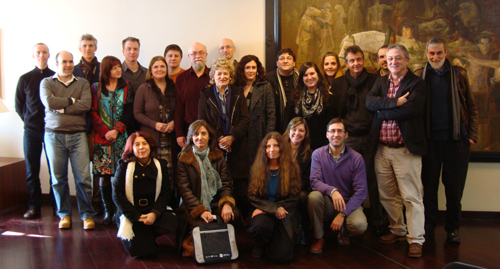
The kick-off meeting of the LOCAW project was held in Corunna last 21-22 January 2011. After the welcome greetings of the Rector of the University of Corunna, Professor Jose M. Barja, and of the Head of the Galician Office for Research and Development (OPIDi), Professor Xavier Alcalá, the meeting proceeded with the two-day session of discussion and debate around organizational and scientific aspects of LOCAW.
Photo gallery of the LOCAW kick-off meeting:
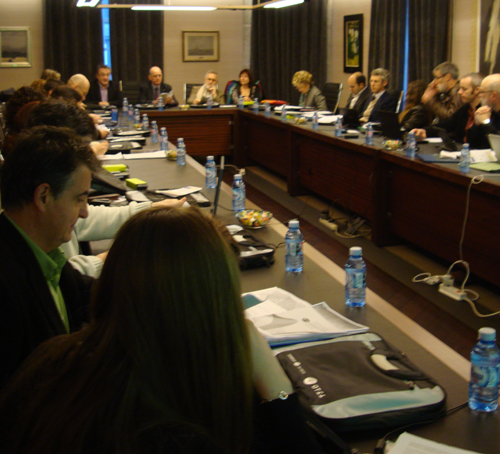 
 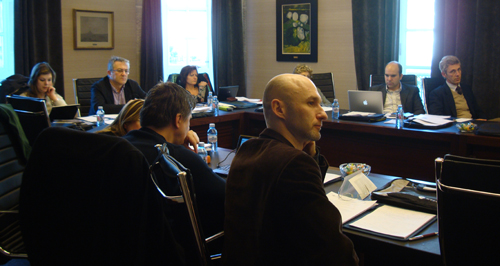
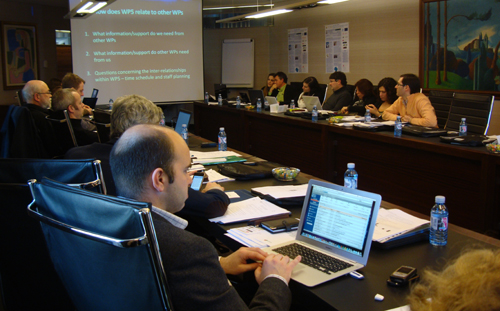 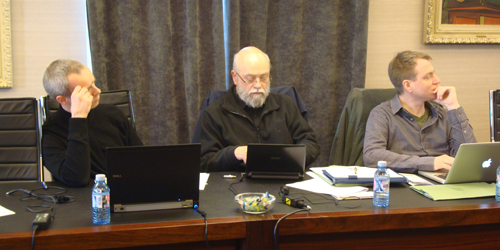
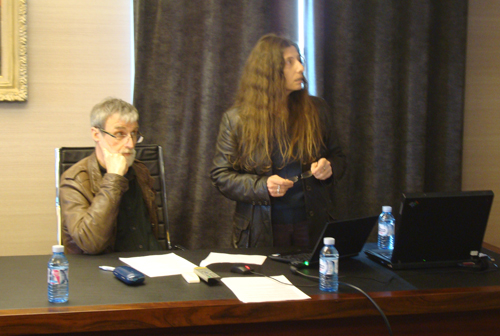 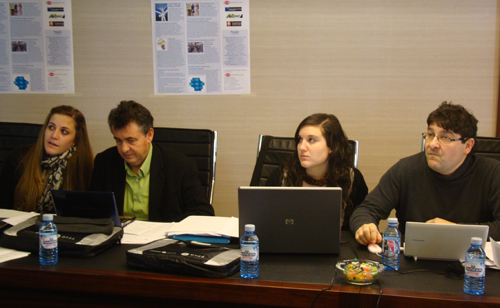
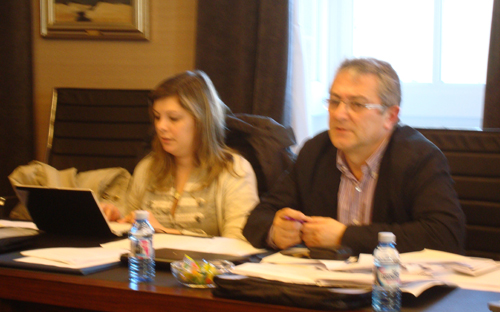 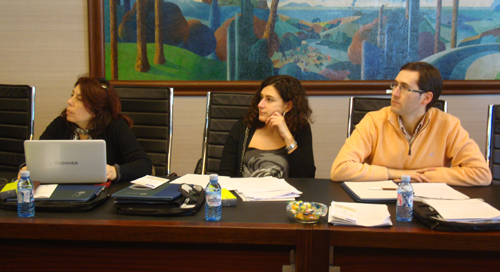
......................................................................................................
|